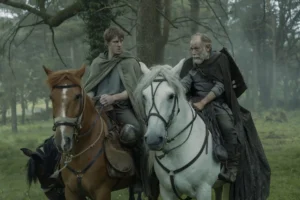Ah, it’s another one of those movies.
Don’t get me wrong: I don’t mean Colossal is in any way typical or familiar – quite the contrary, actually. It’s genre material, sure, but it’s just about the smartest, most interesting thing anyone has done with a kaiju movie in an awfully long time. No, what I mean is that it’s another one of those movies – the ones I can’t properly fucking review because their enjoyment is so heavily predicated on a big plot reveal and, more generally, a sense of surprise at almost every tonal shift and actorly flourish.
The problem, then, is that my role here is to churn out reasonably substantive reviews, and I can’t do that without giving away some of the stuff that makes Colossal one of the best movies of the year so far. So, just take these two paragraphs as a flat-out, unequivocal recommendation. Go and see this movie. And if you have any interest in doing so completely unspoiled (and, make no mistake, that’s the best way of seeing it) then don’t read any further into this review.
If it weren’t for reviews like this one, and, I suppose, the teasing scene at the beginning of the movie, you’d be forgiven for thinking that Colossal is something very different from what it ultimately ends up being. Imagine, if you will, a laid-back indie comedy, a diffident drama, one of those bruised psychological stories in which a damaged young woman returns to her nowhere-special hometown and bathes in the nostalgia of old memories and friends. Imagine that woman being played, somewhat self-consciously, by Anne Hathaway. Her name is Gloria. She’s an alcoholic. At the start of the movie, she’s been ejected from her New York apartment by her presumably long-suffering boyfriend (Dan Stevens). Back home, in a sleepily nondescript and picturesque small town, she crawls into the abandoned house of her absent parents and inflates a mattress to black out on.

And black out she does, mostly after long, late-night drinking sessions with a childhood friend, Oscar (Jason Sudeikis), who finds her dragging the mattress down the road and whisks her to a waitressing job in his attractively run-down bar at the end of Memory Lane. What Hathaway does with Gloria makes every link in this chain of events fit seamlessly together. She’s found something to play that lurks halfway between her hapless “aw shucks” attitude and an almost predatory understanding of her cleverness, and her beauty. She’s a user of substances and, increasingly, people. She’s someone you’ve met, or perhaps been. She’s likeable and sympathetic and destructive and frustrating. She’s a person.
What’s not a person is the towering, teetering monster that appears in Seoul, South Korea, and then on the scrolling reels of cable news, the morning after one of Gloria’s drunken mishaps. Or is it? In the hands of another filmmaker, it probably wouldn’t be. Most would be content to let the monster’s story run parallel to Gloria’s; let it sit there as a rather obvious (though inspired) metaphor for self-destructive behaviour never truly being confined to the self. But Colossal is written and directed by Nacho Vigalondo, who has made a career out of peculiar genre films, and who here follows the metaphor to it’s logical extreme: Gloria is the monster.
I don’t mean this in symbolic terms, either. Part of Colossal’s charm is how warmly it embraces the ludicrous idea that whenever Gloria enters a particular part of her hometown at a specific time of day, a real-life, flesh-and-blood, kaiju-style monster materialises on the other side of the world, mimicking her movements right down to her anxious head-scratching tic. The monster’s wanton rampages have just been her, stumbling home drunk.
Like Jordan Peele’s similarly-wonderful Get Out, Colossal uses well-worn genre tropes to guide an audience through neighbourhoods of social unease. It sketches portraits of irresponsible women and aggrieved, entitled men, and hangs them on the walls of a deeply-effecting movie that has the swaggering self-confidence to tunnel right into the core of its bizarre premise. Vigalondo presumes the audience’s complicity in how his movie lives somewhere between allegory and realism; that he has literalised his characters’ personal demons but is content to never present them as anything more than manifestations of their problems. It’s a bold, strange approach. The film never expands outward, but follows its own narrow tracks until the stories inevitably coalesce. And when they do, in a way that is obvious but nonetheless fascinating, it’s difficult not to respect Vigalondo’s willingness to strip his inherently-symbolic premise of all its symbolism.
There might be a racial, political, or cultural point to be made about Westerners projecting their destructive personal turmoil on another culture, but Colossal isn’t interested in making it. There might also be a logical leap for the audience to take when they see how quickly Gloria and her fellow barflies (Austin Stowell; Tim Blake Nelson) connect the dots between their issues and the creature’s rampage, and how accepting they are of it, but Colossal isn’t worried about that, either. This is movie that knows exactly what it is and what it wants to say. It just assumes you’ll be listening.




